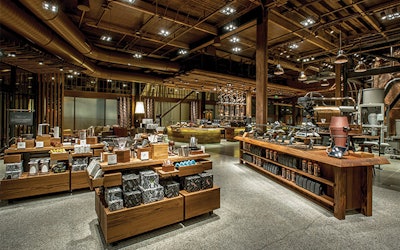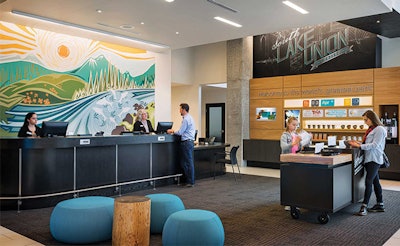
Here's something that'll sound weird: I love retail, but I hate shopping.
Let me explain: So much of shopping is a matter of checking off your to-do list, like picking up groceries or getting school supplies in fall. What thrills me about great retail is seeing businesses that excel at customer service and create an unforgettable experience — so much so that customers can't help but tell their friends. THAT is the goal.
And the beautiful thing about the pool and spa industry is that there is so much room for creating such a positive reaction from customers; it's just that many don't know where to start.
In my opinion, the best place to start is by taking a look at a store that does it very well, and then adapting their ideas. It's really very simple.
With that in mind, here are a few lessons I've learned from other retailers, along with ideas of how you can integrate them into the pool and spa environment.
1. Think like you're a must-see destination.
Here's a question to consider: What would it be like if your store was so impactful that tourists wanted to stop there on vacation?
I know that sounds crazy, but there are stores just like that. For example, I recently went to Waco, Texas, and before I went, everyone asked me if I was going to Magnolia Market, the store owned by "Fixer Upper" stars Chip and Joanna Gaines. (In fact, I have friends who took a vacation to Waco entirely because they wanted to go to Magnolia!)
Now think back to your store. What are you doing to give people a unique experience? How does your space get people fired up and saying "wow" when they walk in?
At Magnolia Market, there's the store itself as well as an outdoor area with picnic tables, food trucks and yard games. People don't just go to shop, they want to spend time there.
This concept can easily translate for pool and spa stores. If you have a bit of grass, turn it into a space for cornhole games, ladder golf or badminton. (Even better: Pick a game you sell in your store to encourage people to bring the fun home!)
RELATED: Sensory Sales for the New Consumer
I live in the Portland area, and we have a chain of banks called Umpqua Bank, which focuses on "slow banking." While they have all the digital banking services you'd expect, like apps and mobile check depositing, they want their locations to be so hip and fun that people want to deposit a check in person.
They accomplish that in several ways. Each location looks nothing like a bank — think hotel lobby with no stanchions in sight. They always have complimentary coffee and cookies. Some even have little libraries!
What can you offer at your store to make the experience better for your customers? How about cucumber water in summer? Coffee or tea? Apple cider in fall? Chips or other small snacks?
I know some of you are thinking that'll be expensive. But think of it this way: How many people do you have in your store on a busy day? If you spend just one dollar on every one of those people to make their experience memorable, and allocate money in your marketing budget for it, it's probably a screaming good deal compared to the newspaper ad you ran last year. People talk about stores like that!
2. Little things make a HUGE difference.
The Starbucks Reserve Roastery in Seattle is one of the most epic retail experiences ever. It's a roasting factory that has a bar and a pizza place in it, and it looks very Willy Wonka-esque — pipes running everywhere, demonstrations, it's all magical.
When you walk in the front doors, which are absolutely beautiful glass doors with leather-clad bronze pulls, a concierge greets you and tells you about the day's roasts. This person's other job is to clean those glass doors.
The last time I was there, I saw the concierge cleaning them and asked how often they clean the doors. "Every 10 minutes," he said.
That may sound excessive, but I'm telling you, they do it because it matters.
Researcher Martin Lindstrom found that when it comes to shopping, 90 percent of each buying decision is made subconsciously. And it's because of small stuff that sways the purchasing decision one way or the other.
In other words, DO sweat the small stuff — because small stuff really matters.
Look around your store and ask yourself: Are the doors and windows clean? When was the last time the water was tested in the display models? When was the last time you completely emptied the water care display and dusted? Do you have point-of-sale signage that's outdated or bleached from sun exposure? Do all of your hot tubs have signage? Look closely and consider everything. You want to make sure nothing detracts from your customer's "wow" experience. Every component in the showroom either helps or hurts, there is no neutral.
 At Umpqua Bank, guests are invited to deposit a check and stay awhile. Free coffee and snacks, little libraries, pop-up shops and access to conference rooms are just a few ways Umpqua draws guests in.
At Umpqua Bank, guests are invited to deposit a check and stay awhile. Free coffee and snacks, little libraries, pop-up shops and access to conference rooms are just a few ways Umpqua draws guests in.
3. Lay roots in your community.
Let's revisit the Umpqua Bank example I addressed in No. 1. The other thing Umpqua excels at is establishing a name for itself in the local community. Many locations, for example, have meeting rooms that anyone in the community can use, for free. (The Starbucks Reserve does, too!) You can go online, sign up for a room and hold a book club meeting there.
Sure, you may not have room for that purpose. But if you have a nice display pool outside, could you perhaps allow people to rent it for charity events and parties? Do you have a nice landscaped area? Try inviting yoga studios to have outdoor classes. Even your parking lot is valuable space — you could invite local artisans for a pop-up craft show. None of these ideas cost you much of anything but offer something really valuable to people in your community.
RELATED: Act Like a Local Hero in Your Community
Think about what you can offer beyond your physical space, too. Umpqua Bank, for example, has an ice cream truck they drive around each summer, giving away free ice cream. In the winters, they offer free gift wrapping. And they're not talking to you about where you do your checking while you get an ice cream cone — they're doing it because it's nice and gets their name out there.
Yes, a company ice cream truck may be farfetched for most pool and spa pros, but you get the point. Think about what you could do (safely, as there is some liability you assume with a few of these ideas) that would make you more than what you are. How do you become part of the community instead of just "a place?"
4. Watch where you put after-market products.
Imagine we're going out to buy you a brand new car. We just pulled up to the lot and you're super excited. You've been thinking about this car forever, you finally have the money and you're beyond ready.
So we walk though the front doors and we don't see any cars in the showroom. Instead, we see a pile of 30 tires.
Then we go a little bit further and then see three cases of oil.
And then — what is this? Tanker trucks filled with gas? Wow. Ok.
Finally, after all that walking, we see the car. We just walked past everything you're going to use or will use to own that car in your lifetime. You're not feeling so stoked about the car anymore, right?
But that's what so many pool and hot tub stores do. When new guests come in and see O-rings, gauges and valves right up front, they're suddenly not as excited about a pool or spa purchase, are they? They're thinking, "Man, is this what I'm in for if I get a hot tub?"
You want to cultivate excitement in your store. When it comes to small parts like valves and O-rings, put those parts at the back of the store or, better yet, behind the service desk, which invites conversation between the homeowner and service pro.
On a similar note, you should also make sure your water care products are at the back of the store. Why? Because the customers most likely to buy a hot tub are the ones who already have one. By putting water care at the back, you encourage them to walk through new products every time they come into the store.
RELATED: Store Design — Go With the Flow
It's basically the same principle grocery stores use: Milk is always at the back because they want you to walk through everything else to get it, and maybe toss a few extra items in your cart along the way.
5. Remember who your real competition is.
People are not comparing you to the other hot tub store down the street. They're comparing you to the Apple stores they've been in, they're comparing you to Macy's, they're comparing you to their favorite retail website.
You're not competing for marketing attention inside your bubble of backyard water. You're competing against the whole world of marketing and that set of expectations.
RELATED: A Hot Tub Showroom With an Apple Store Twist
It's not good enough to just have a nice showroom in a nice spot with products on display and educated staff anymore. You'll get some business that way, but if you can't become a destination with a true experience, you'll be replaced by the internet. It's that simple.
But if you think creatively and get comfortable trying new, outside-the-box ideas that may seem a bit crazy, you'll find you can truly surprise and delight people when they come into your store.
Mario Maichel is the retail marketing manager at Watkins Wellness.












































